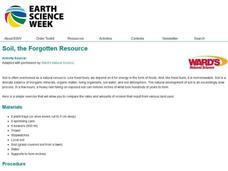Curated OER
Field Trip to your Square
Students visit an outdoors area and mark out a square on the ground that they examine. They look for and record the plants, animals, and non-living things they find in the square and post their findings on the Internet for other classes...
Curated OER
Assignment on Life Processes
In this life processes worksheet, 8th graders create a children's book about the 7 functions of life that all living organisms have, complete with examples of living and non-living things.
Curated OER
What on Earth is in the Earth?
Students explore the physical properties of sand, soil, and rocks and sort, classify, compare, and contrast the materials found in the soil. The differences between the living and non-living parts of the soil is discussed.
University of Southern California
Human Impact on the Sea
How far does the human hand reach? Five interactive lessons lead classes through a unit exploring the human impact on ocean resources, pollution, and even extinction. Learners discover how their decisions affect the ocean environment...
Curated OER
Living and Non-Living
Fourth graders are divided into small groups and collect 4 objects from the playground. They take 5 to 10 minutes to classify their groups and discuss their findings including the terms "living" and "non-living". As a class they discuss...
Curated OER
Living or Nonliving
Third graders brainstorm a list of the characteristics of living and nonliving organisms. Individually, they find four nonliving and living items and the characteristics that make them fit into one of the categories. To end the lesson,...
Curated OER
Investigation 1 - Intro: Living & Nonliving
Third graders distinguish between living and nonliving things.
Journey Through the Universe
Is There Anyone Out There?
What is an alien's favorite game? All-star baseball! Scholars start defining living and non-living. Then, they conduct experiments to research if life exists, keeping in mind that life could be in many forms, not just human.
Curated OER
The Living Environment
Students explore the cycles of an ecosystem. In this environmental science lesson, students work in groups to research the nitrogen cycle, the water cycle, or the oxygen-carbon dioxide cycle. Students prepare a PowerPoint or other...
Curated OER
Flower Power
An engaging, multi-session art and science lesson awaits your class. Within this lesson, you'll find everything you need to implement the plan. They go on a nature walk around their school, and must identify many living and non-living...
Captain Planet Foundation
Sorting Out Soils
Sift through soil and learn about why it's important for organic processes. After discussing what makes up soil, such as the living organisms and what types of soil have more nutrients, kids sample layers of mulch and deeper soil to...
Curated OER
Nuclear Fleas
Seventh graders distinguish characteristics of living things and identify the importance of careful observation. They identify five things that are not alive, but display characteristics of life and list five things that are alive, but...
Curated OER
It's Alive
Students identify the differences between a nonliving and living thing. They describe what is needed for any living thing to survive. They create one page for the class book identifying why the object is a living thing.
Curated OER
Dinnertime for Animals
Is a deer an herbivore? What about a spider? Experiment with the food chain in an interactive science experiment. After listing the herbivores from a selection of animals, third and fourth graders compare the skulls and teeth of...
Curated OER
Characteristics of Living Things
Seventh graders identify the characteristics of living and non-living things. In this biology lesson, 7th graders define vocabulary words as they go through the lesson. They answer a crossword puzzle after class discussion.
Curated OER
Worming Your Way Through the Soil
Students study soil, living and non-living particles in the soil, and learn about composting. In this soil study lesson, students study soil samples and discuss the living and non-living components of the soil. Students classify the...
Curated OER
Scavenging the Sandy Shore
Students explore oceanography by examining a beach. In this living things lesson, students define the terms abiotic and biotic and practice identifying living and non-living things that have been previously found on a beach. Students...
Curated OER
Food Chain/Food Web
Students explore ecosystems. In this ecology lesson, students read an article explaining ecosystems. Students create a visual organizer with index cards using components of various ecosystems.
Curated OER
Soil, the Forgotten Resource
Students discuss soil understanding that is is often overlooked as a natural resource. In this science lesson, students recognize that we depend on it for energy in the form of foods. Students experiment with six boxes of soil to help in...
Curated OER
It's Alive
First graders critically analyze living and nonliving objects, then develop a list of characteristics to classify objects on a science walk. They make a book to close out the lesson.
Curated OER
Secrets to Healthy Soil
Fourth graders explore needed mineral nutrients for healthy soil. In this soil lesson, 4th graders investigate how living and nonliving elements combine to contribute to fertile soil development.
Denver Art Museum
The Poetry in Non-Events
The photograph, Nellie and her Italian Soda is viewed and discussed by the class. They are instructed to use the photograph as inspiration to write a poem about non-events, or things that are beautiful in every day life. Pupils use a...
Curated OER
What Lives in Forests?
In this forest activity, students complete a graphic organizer by filling in 3 statements about what lives in a forest habitat.
National Wildlife Federation
Habitat Web
Young scientists weave together an understanding of ecosystems with this fun collaborative activity. Taking on the roles of different living and non-living elements of specific habitats, learners use a ball of yarn to create the web of...

























